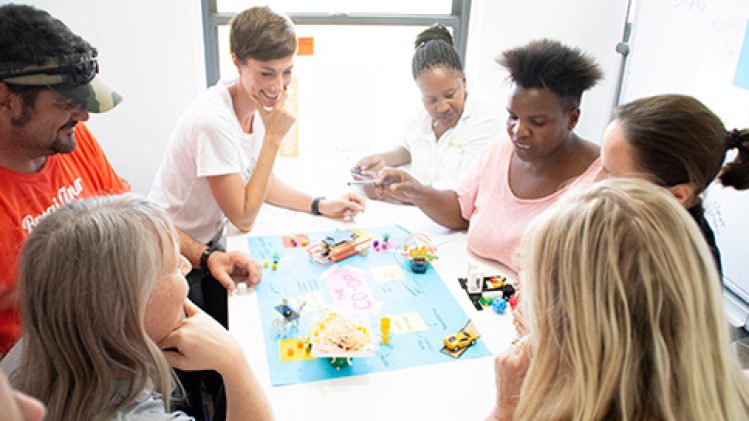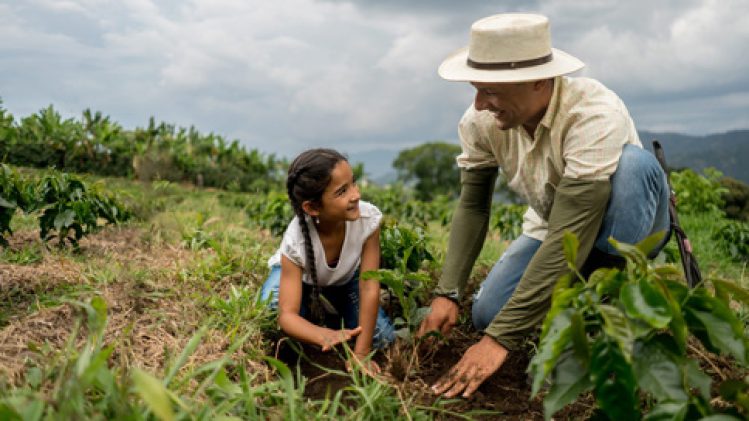Foundations as Catalysts for Resilience
Nurturing Creativity in an Evolving Landscape
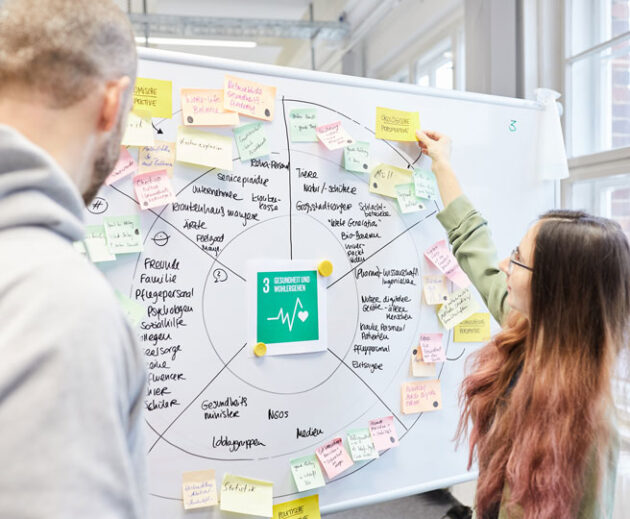
Foundations can play a key role in promoting resilience. As representatives of civil society, they are particularly well suited to forging local, national, and international partnerships and providing testing grounds for new solutions that enable sustainable social development in a VUCA world. In a guest article for the German magazine “Stiftung & Sponsoring” (“Philanthropy & Sponsorship”), our Managing Director, Dr. Nina Smidt, elaborates on how Siemens Stiftung’s new strategy contributes to this. Read the English translation of the article here.
«Resilience also means shaping positive transformation.»
How can philanthropic efforts achieve maximum impact in a rapidly changing world? How can they consistently generate sustainable social value in a volatile, uncertain, complex, and ambiguous global landscape (VUCA)? Where we are increasingly witnessing rapid accelerating and profound transformations.The acronym “VUCA” encapsulates the discussions on these phenomena.
At Siemens Stiftung, we have delved deeply into these central questions. Through a strategic process involving our whole foundation team, we scrutinized the areas where our expertise in Education, Social Entrepreneurship, and Arts & Culture, coupled with our financial resources, can provide the most impactful catalysts. We also explored avenues to enhance synergies within our team and broader network.
We also focused on strengthening the resilience of individuals, organizations, communities, and the environment. In other words, the ability not only to adapt to changing circumstances, but also to learn from them in order to effectively prepare for future changes and thus shape positive transformation.
Strengthening resilience with three new thematic areas
Siemens Stiftung will focus its project work on the three thematic areas of “Access to Essential Services”, “Connected Societies” and “Climate & Sustainability”.
Access to Essential Services is fundamental to life and plays a crucial role in development going forward. Our efforts focus on supporting individuals and organizations striving to enhance existing supply systems. Our priority areas are geared to the UN Sustainable Development Goals (SDGs), including sustainable energy, e-mobility, along with water and sanitation.
In the area of “Connected Societies”, we create spaces for mutual learning and knowledge transfer with the aim of enabling participation and promoting equal opportunities. Through our national and international networks and projects, we promote innovative and inclusive learning, while cultivating a culture of digitalization that combines the strengths of the digital and analog worlds in meaningful ways.
Protecting and preserving the planet for future generations requires cross-sectoral collaborations and a move toward holistic, sustainable practices that combine social, ecological, and economic objectives. In the area of “Climate & Sustainability”, we strive to drive this necessary process of transformation through climate change education, cultural initiatives, and social entrepreneurship.
There is a whole range of factors that have a positive impact on resilience, such as strong social relationships, flexibility and adaptability or self-efficacy, i.e. the ability to overcome challenges and exert a positive influence on one’s environment. In project development, we pay increased attention to these and other resilience factors. Based on many years of project experience in Africa, Europe, and Latin America, we are convinced that two approaches strengthen resilience in a particularly effective and sustainable way: joint learning and local, sustainable structures.
Learning together strengthens trust and self-efficacy
«The ability to share knowledge and learn from one another is becoming increasingly important.»
In a world that is constantly changing, the ability to share knowledge and learn from one another is becoming increasingly important. Establishing a learning culture is not only essential for personal growth, but also for the development of organizations and entire communities. It creates the basis for a collaborative and inclusive environment and generates synergies that can produce innovative solutions.
Education plays a pivotal role in equipping individuals for the challenges that lie ahead, encompassing issues like climate change, globalization, and digitalization. The conventional approach of simply imparting knowledge is no longer sufficient. In our project initiatives, we intentionally cultivate environments conducive to mutual learning and knowledge exchange. We provide methodologies and skills designed to actively shape transformation and navigate change. Within the context of our increasingly technology-driven world, STEM education holds a distinct significance. The objective is to kindle the curiosity of children and young people through hands-on lessons, where their own actions, experiments, and critical inquiry into results assume a central role. Particularly, STEM education that transcends disciplinary boundaries can adeptly prepare them to address challenges in a world characterized by volatility, uncertainty, complexity, and digital dynamics.
With our Design Thinking in STEM project, for example, we offer workshops for STEM teachers on three continents. This innovative teaching and learning method encourages students to approach problems through empathy and from the user’s perspective. Ideas and solutions are made visible and tangible as prototypes as early as possible in interdisciplinary teamwork. This allows them to be tested and evaluated directly. Students use this creative method to work in teams and eventually become designers of a future that will look different from our current world, experience self-efficacy and thus strengthen their resilience.
Local, sustainable structures as innovation hubs
Providing affordable, sustainable energy worldwide is a major challenge. The problem is particularly urgent in Africa, where large parts of the population still have no access to affordable and reliable energy supplies and a secure basic supply is not guaranteed. This is where Siemens Stiftung and the 30-partner consortium Smart Energy Solutions for Africa (SESA) come in. As part of the project, companies selected through tenders in nine African countries are testing innovations and business models in the energy sector for vulnerable low-income groups and adapting them to local needs.
To secure the replicability of project outcomes and foster enduring social impact, close collaboration is fostered among local stakeholders, national and regional administrations, and European institutions. Local authorities and businesses actively engage in the collaborative development process, participating in peer learning activities and other capacity-building initiatives integral to the project. The establishment of living labs serves as a catalyst for the collective creation of scalable and replicable innovations in energy access. These innovations aretested, validated, and subsequently replicated in different regions across the African continent. This approach cultivates locally embedded ecosystems equipped to adapt to future changes. Simultaneously, the involved companies contribute to local ecological, social, and economic development.
«Our guiding principle at Siemens Stiftung in these times is ‘Together’.»
Foundations can build resilience
Foundations themselves are considered to be particularly resilient due to their long-term orientation, flexibility, independence and ability for innovation. In “VUCA” times, however, they are also being put under unprecedented pressure to change. The question is not only how to make your own foundation’s assets crisis-proof, but also how to align your own project portfolio so that it creates social benefits as sustainably as possible, even under constantly changing circumstances.
Our guiding principle at Siemens Stiftung in these times is “Together”. We are convinced that we can successfully master the major global challenges if we tackle them together. That is why we always work with partners in Africa, Europe, and Latin America on all of our projects. Cross-sector alliances can effectively pool diverse resources and expertise and thus provide impetus for systemic change. The co-constructive approach is particularly important here, as incorporating the diverse perspectives of different actors creates innovative, robust solutions and allows us to respond more effectively and flexibly to unforeseen events.
The article has been published in the autumn issue of “Stiftung & Sponsoring” in 2023. The original German version can be downloaded here:
for a sustainable social development
Access to
Essential Services
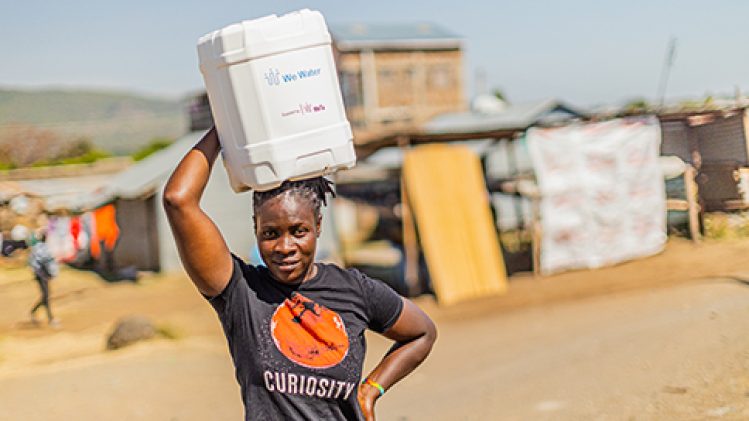
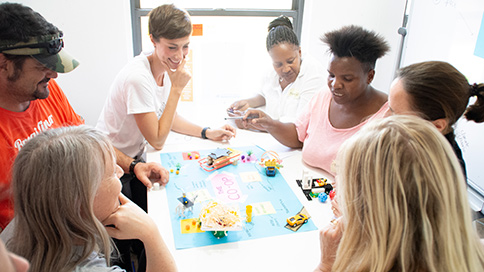
Societies
